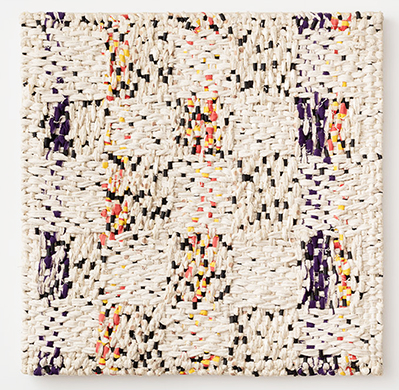'직조된 역사: 직물과 모던 추상'@내셔널갤러리, DC(3/17-7/28)
Woven Histories: Textiles and Modern Abstraction
March 17 - July 28, 2024
National Gallery of Art, Washington

Ed Rossbach, Damask Waterfall, 1977, cotton welting cord, commercial fabric, plastic, satin damask, wrapped, overall: 91.4 x 91.4 cm (36 x 36 in.), LongHouse Reserve. Photo © Charles Benton, Courtesy The Artists’ Institute
Washington, DC—In recent decades, textiles have assumed an increasingly substantial place in the globalized art world. Woven Histories: Textiles and Modern Abstraction proposes that abstraction, modernism’s primary visual language, has been entwined with textile’s materials, technologies, and issues since its inception. Highlighting the transformative roles played by women and other marginalized creators, this exhibition explores the shifting relationship between abstract art, fashion, design, and craft over the past 100 years. Comprising some 160 works in diverse mediums, Woven Histories is on view from March 17 through July 28, 2024, in the East Building of the National Gallery of Art.
"This exhibition fundamentally reshapes narratives of modern art by exploring the relationship between abstraction and textiles," said Kaywin Feldman, director of the National Gallery of Art. "The conversations created by artists working across mediums, generations, and continents reinforce the centrality of cloth and fiber in the history of modern art."
Woven Histories delves into dynamic moments when social and political issues have activated textile production and artmaking with heightened focus and urgency. In the aftermath of World War I, avant-garde women artists inspired by utopian social visions created designs for textiles and apparel that played a key role in shaping the modern era. The Black, gay, and feminist liberation movements of the 1960s and the 1970s counterculture placed increasing significance on dress as a marker of identity and resistance. Their legacies were taken up in the following decades by a cohort of young women artists whose feminist-inspired practices fuse dress, textile, and artmaking as forms of self-fashioning. Others draw on their Indigenous cultural heritages in works that seek to build community and center marginalized histories. And as globalization and the digital revolution transform everyday life, creators worldwide critique the harms caused by the outsourcing of mass-produced textiles and apparel to low-wage economies and the resulting environmental devastation.





